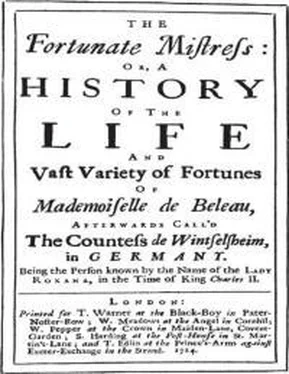Well, my Dear, says he again , I only talk of putting out a little Money to Interest, our Maker is a good Borrower, never fear making a bad Debt there, Child; I’ll be Bound for it.
Don’t banter me with your Charity, and your Allegories, [44] Allegories : figurative language (as in the preceding paragraph).
says the Wife angrily , I tell you they are my Relations, not yours, and they shall not roost here, they shall go to the Parish.
All your Relations are my Relations now, says the good Gentleman very calmly , and I won’t see your Relations in Distress and not pity them, any more than I would my own; indeed, my Dear, they shan’t go to the Parish, I assure you none of my Wife’s Relations shall come to the Parish, if I can help it.
What, will you take four Children to keep? says the Wife .
No, no, my Dear, says he , there’s your Sister —, I’ll go and talk with her, and your Uncle —, I’ll send for him and the rest; I’ll warrant you when we are all together we will find Ways and Means to keep four poor little Creatures from Beggary and Starving, or else it will be very hard; we are none of us in so bad Circumstances but we are able to spare a Mite for the Fatherless; don’t shut up your Bowels of Compassion [45] your Bowels of Compassion : 1 John 3:17.
against your own Flesh and Blood: Could you hear these poor innocent Children cry at your Door for Hunger, and give them no Bread? [46] give them no Bread : echoes Lamentations 4:14.
Prethee [47] Prethee : prithee, pray.
what need they cry at our Door? says she , ’tis the Business of the Parish to provide for them, they shan’t cry at our Door; if they do, I’ll give them nothing: Won’t you, says he , but I will, remember that dreadful Scripture is directly against us, Prov.2l : 13. Whoso stoppeth his Ears at the Cry of the Poor, he also shall cry himself, but shall not be heard .
Well, well, says she , you must do what you will, because you pretend [48] pretend : intend.
to be Master; but if I had my Will, I would send them where they ought to be sent, I would send them from whence they came.
Then the poor Woman put in, and said, But, Madam, that is sending them to starve indeed; for the Parish has no Obligation to take Care of ’em, and so they would lie and perish in the Street.
Or be sent back again, says the Husband , to our Parish in a Cripple-Cart, by the Justice’s Warrant, [49] by the Justice’s Warrant : Under the terms of the Law for the Better Relief of the Poor (1662) the Church Wardens and parish Overseers could apply to two local Justices of the Peace for a warrant of removal, by which the children could be returned to the parish from whence they came on the grounds that the legal settlement of the parents had been established there. The dispute in the preceding paragraphs is over the responsibility for poor relief – that is, whether the parish in which the children were born, or the parish in which their father had settled, is responsible. Throughout the hundred and thirty years or so that this law was enforced there was a great deal of inter-parochial litigation over the question of what constituted ‘settlement’.
and so expose us and all the Relations to the last Degree, among our Neighbours, and among those who knew the good Old Gentleman their Grandfather, who liv’d and flourish’d in this Parish so many Years, and was so well belov’d among all People, and deserv’d it so well.
I don’t value that one Farthing, not I, says the Wife , I’ll keep none of them.
Well, my Dear, says her Husband , but I value it, for I won’t have such a Blot lie upon the Family, and upon your Children; he was a worthy, ancient, and good Man, and his Name is respected among all his Neighbours; it will be a Reproach to you, that are his Daughter, and to our Children, that are his Grand-Children, that we should let your Brother’s Children perish, or come to be a Charge to the Publick, in the very Place where your Family once flourish’d: Come, say no more, I’ll see what can be done.
Upon this, he sends and gathers all the Relations together at a Tavern hard-by, and sent for the four little Children that they might see them; and they all, at first Word, agreed to have them taken Care of; and because his Wife was so furious that she would not suffer one of them to be kept at Home, they agreed to keep them all together for a-while; so they committed them to the poor Woman that had manag’d the Affair for them, and enter’d into Obligations to one another to supply the needful Sums for their Maintenance; and not to have one separated from the rest, they sent for the Youngest from the Parish where it was taken in, and had them all brought up together.
It would take up too long a Part of this Story to give a particular Account with what a charitable Tenderness this good Person, who was but Uncle-in-Law to them, manag’d that Affair; how careful he was of them; went constantly to see them, and to see that they were well provided for, cloath’d, put to School, and at last put out in the World for their Advantage; but ’tis enough to say he acted more like a Father to them, than an Uncle-in-Law, tho’ all along much against his Wife’s Consent, who was of a Disposition not so tender and compassionate as her Husband.
You may believe I heard this with the same Pleasure which I now feel at the relating it again; for I was terribly frighted at the Apprehensions of my Children being brought to Misery and Distress, as those must be who have no Friends, but are left to Parish Benevolence.
I was now, however, entring on a new Scene of Life; I had a great House upon my Hands, and some Furniture left in it, but I was no more able to maintain myself and My Maid Amy in it, than I was my five Children; nor had I any thing to subsist with, but what I might get by working, and that was not a Town where much Work was to be had.
My Landlord had been very kind indeed, after he came to know my Circumstances, tho’s before I [50] I : the 1750 edition reads ‘he’.
was acquainted with that Part, he had gone so far as to seize my Goods, and to carry some of them off too.
But I had liv’d three Quarters of a Year in his House after that, and had paid him no Rent, and which was worse, I was in no Condition to pay him any; however, I observ’d he came oftner to see me, look’d kinder upon me, and spoke more friendly to me, than he us’d to do; particularly the last two or three times he had been there, he observ’d, he said , how poorly I liv’d, how low I was reduc’d, and the like, told me it griev’d him for my sake; and the last time of all he was kinder still, told me he came to Dine with me, and that I should give him leave to Treat me; so he call’d my Maid Amy , and sent her out to buy a Joint of Meat; he told her what she should buy, but naming two or three things, either of which she might take; the Maid, a cunning Wench, and faithful to me, as the Skin to my Back, did not buy any thing outright, but brought the Butcher along with her, with both the things that she had chosen, for him to please himself; the one was a large very good Leg of Veal; the other a Piece of the Fore-Ribs of Roasting Beef; he look’d at them, but bade me chaffer with the Butcher for him, and I did so, and came back to him, and told him what the Butcher demanded for either of them, and what each of them came to; so he pulls out 11 s . and 3 d . which they came to together, and bade me take them both, the rest, he said, would serve another time.
I was surpriz’d, you may be sure, at the Bounty of a Man that had but a little while ago been my Terror, and had torn the Goods out of my House, like a Fury; but I consider’d that my Distresses had mollified his Temper, and that he had afterwards been so compassionate as to give me Leave to live Rent-free in the House a whole Year.
Читать дальше











